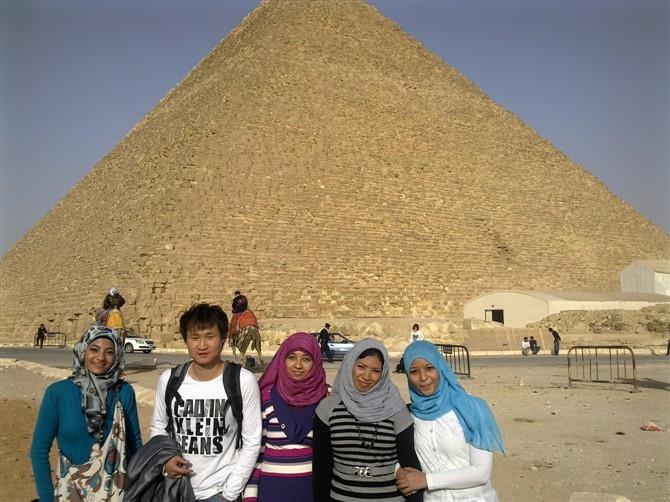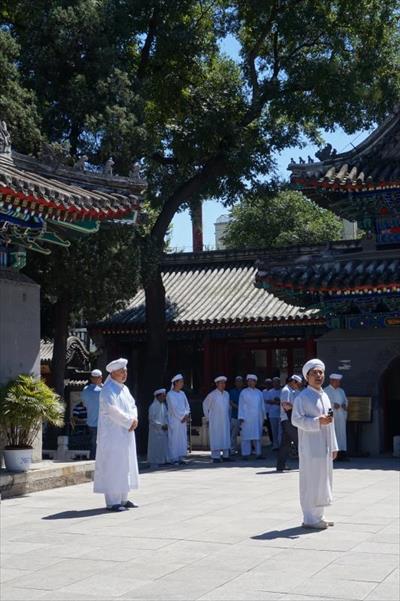|
||||||||||
| Home Nation World Business Opinion Lifestyle ChinAfrica Multimedia Columnists Documents Special Reports |
|
||||||||||
| Home Nation World Business Opinion Lifestyle ChinAfrica Multimedia Columnists Documents Special Reports |
| Lifestyle |
| Crossing Cultural Borders |
| Young Chinese Muslims are reclaiming their traditional role as cultural and commercial go-betweens on the new Silk Road |
| By François Dubé ·2017-01-18 |

Hong belongs to the Hui ethnic minority, China's largest Islamic minority group with a population of 10.5 million, according to China's population census in 2012, which is equivalent to Tunisia's population. Hui are found throughout China, and are said to be the descendants of local people and Persian and Arab traders who used to travel along the ancient Silk Road between China and the West, trading and transporting goods like silk, gems and spices, but also manuscripts, artworks and ideas.
As the Belt and Road Initiative is becoming a tangible reality, reinforcing ancient trade routes between China and Europe, young Hui people are reclaiming their traditional role as cultural and commercial "middlemen" between China and the Islamic world, and like Hong, are increasingly called upon to play a key role in trade and cultural exchanges.
Unlocking potential
It is primarily the prospects of finding a better job that led Hong to start learning Arabic in 2006. He soon realized his Islamic heritage could serve as a springboard to further develop his career abroad.
His linguistic skills and his spirit of adventure first led him to Egypt, where he studied for a year at Al-Azhar University in Cairo, and then on to Jordan and the United Arab Emirates, before finding work as an assistant manager for a Chinese oil company based in Ramallah, Iraq. Although working conditions in Iraq were difficult, these were offset by higher wages - on average four times higher than for the same job in China.
Once there, Hong realized that similarities in religious and cultural practices between Hui and fellow Muslims in Iraq helped him blend in with his local colleagues. Their common faith also brought benefits to his company. His knowledge of Muslim traditions, taboos and customs was useful in ensuring smooth relations with government authorities - a significant advantage in a country where foreign companies must operate in an often unstable, sometime even chaotic, regulatory environment.

After returning to China in 2013, Hong founded his own consulting business - Zhonglian Tuohai Foreign Affairs Consulting Service Co. Ltd. - which mainly focuses on bridging the gap between North African and Middle Eastern companies and Chinese technicians. With a foot in each culture, Hong strives to fulfill the role of cultural go-between along the new Silk Road, allowing Chinese professionals to develop their skills and earn higher wages abroad, while supporting the development of trade and cultural exchanges.
Over the past three years, his company has successfully sent several Chinese technicians on work assignments to Algeria, Qatar and Saudi Arabia. Even though he faces strong competition from Indian and Bangladeshi workers, Hong is confident that Chinese talents can carve out a niche for themselves in Arab markets.
"Chinese technicians offer better quality work at a reasonable price, and they know how to work efficiently, so they are in high demand, particularly in Arab countries," he told ChinAfrica.
Building trust
One of the industries where this cultural comparative advantage has been most effective is the halal food industry.
Ma Bin is the director of Ningxia Halal Food Certification and International Trade Center, an organization based in Yinchuan involved in food product certification. Since its establishment in 2008, the center has accredited more than 100 companies, allowing them to display the halal symbol and indicating their products are suitable for consumption for Muslim people.
"The halal food industry has good prospects for development, thanks in part to the Hui people, who are both our source of expertise and our main consumer base," says Ma.
According to Ma, one of the major problems still hindering exports of local products is that foreign consumers are simply unaware that Muslims have been living in China for centuries, and therefore are reluctant to buy Chinese products labeled as "halal." Ma says members of the Hui minority can play a role in resolving this lack of trust by spreading awareness about China's thriving Islamic community.
As proof, he points out that local companies have begun to use agents and intermediaries - more often than not Hui - to secure access to lucrative markets in the Middle East.
"The fact that they know the culture and language, and that they are themselves consumers of halal food products, reassures our customers about the reliability of our certificate," he told ChinAfrica.
Bonding through faith
As one of the youngest imams (Muslim priest or leader) in Beijing, Ding Wenjian - who speaks fluent Arabic - fully understands and supports the desire of Chinese youth to combine religion and professional development.
Originally from the Dachang Hui Autonomous County in Hebei Province, Ding graduated from China Islamic Institute in Beijing in 2004 before joining Beijing's Niujie Mosque - one of the oldest mosques in China. Today, he sings the daily calls to prayer and devotes a significant portion of his time to educate Hui youth on the basic teachings of Islam, emphasizing the positive role faith can play for their individual growth, as well as for China's development.
"By learning about their faith, Chinese Muslim youth can significantly support the development of their country and become an essential part of the Belt and Road Initiative. It is easier for them to relate to other Muslims and Arab people, as they speak a common language and share the same religion," the 40-year-old imam told ChinAfrica just after Friday prayers. "This is especially useful in making connections, because it builds trust between people, and thus facilitates trade."
Ding insists on the fact that religion can unlock untapped potential for trade and cultural exchanges, bringing significant benefits which extend beyond the Chinese Islamic community. "A majority of these young Hui people are not serving their religion directly, but they all end up making huge contributions to the development of society," he said.
According to him, by becoming effective mediators between China and the Islamic world, young Hui people are promoting a positive and constructive image of their religion within Chinese society, which tends to increase tolerance and social harmony. Ultimately, Ding said, "this benefits society as a whole."
|
||
| About Us | Contact Us | Advertise with Us | Subscribe |
| Copyright Beijing Review All rights reserved 京ICP备08005356号-5 京公网安备110102005860号 |